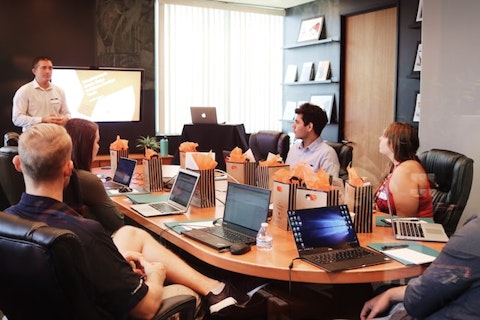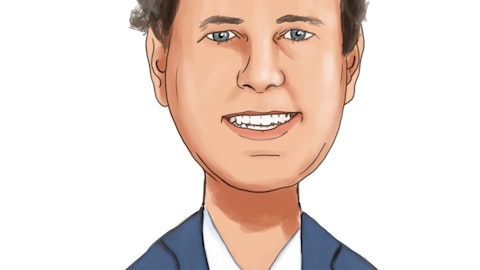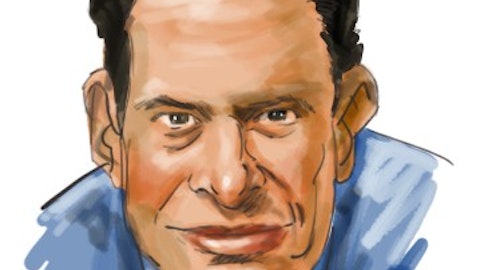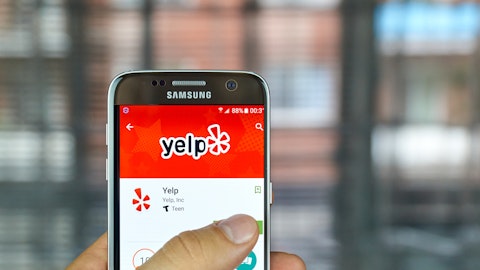Yelp Inc. (NYSE:YELP) Q4 2022 Earnings Call Transcript February 9, 2023
Operator: Good afternoon. Thank you for attending today’s Yelp Fourth Quarter and Full Year 2022 Earnings Conference Call. My name is Megan, and I’ll be your moderator for today’s call. I would now like to pass the conference over to James Miln, Senior Vice President of Finance and Investor Relations. James, please go ahead.
James Miln: Good afternoon everyone, and thanks for joining us on Yelp’s fourth quarter and full year 2022 earnings conference call. Joining me today are Yelp’s Chief Executive Officer, Jeremy Stoppelman; Chief Financial Officer; David Schwarzbach; and Chief Operating Officer, Jed Nachman. We published a shareholder letter on our Investor Relations website and with the SEC and hope everyone had a chance to read it. We’ll provide some brief opening comments and then turn to your questions. Now I’ll read our safe harbor statement. We’ll make certain statements today that are forward-looking and involve a number of risks and uncertainties that could cause actual results to differ materially. Please note that these forward-looking statements reflect our opinions only as of the date of this call, and we undertake no obligation to revise or publicly release the results of any revision to these forward-looking statements in light of new information or future events.
In addition, we are subject to a number of risks that may significantly impact our business and financial results. Please refer to our SEC filings as well as our shareholder letter for a more detailed description of the risk factors that may affect our results. During our call today, we’ll discuss adjusted EBITDA and adjusted EBITDA margin which are non-GAAP financial measures. These measures should not be considered in isolation from or as a substitute for financial information prepared in accordance with Generally Accepted Accounting Principles. In our shareholder letter released this afternoon and our filings with the SEC, each of which is posted on our website, you will find additional disclosures regarding these non-GAAP financial measures, as well as historical reconciliations of GAAP net income to both adjusted EBITDA and adjusted EBITDA margin.
And with that, I will turn the call over to Jeremy.
Jeremy Stoppelman: Thanks James, and welcome everyone. Yelp delivered one of the strongest revenue growth performances among our advertising and marketplace peers in 2022. Our performance ad products and high intent audience generated robust advertiser demand across a broad range of categories, both on and off Yelp. Net revenue increased by 16% year-over-year to a record $1.2 billion in 2022. We delivered this performance with net income of $36 million and adjusted EBITDA of $270 million. These results demonstrate the strength and durability of Yelp’s ad platform and the ability of our team to execute under a range of difficult conditions to deliver excellent results. Underlying our record top line our product led strategy drove a number of other record results in 2022.
We achieved record paying advertising locations and average revenue per location for the year. In services, we succeeded in differentiating the product experience and increasing monetization and lead quality resulting in greater value to service growth. We believe Yelp gained market share in 2022 as advertising revenue from services businesses grew 14% year-over-year to a record $694 million. The home services category was particularly strong, with year-over-year growth of approximately 20%. Since 2019, revenue from this category has compounded at an annual growth rate of nearly 20%. Advertising revenue for Restaurants, Retail & Other businesses increased by 17% year-over-year to $441 million, driven by growth in paying advertising locations.
We continue to deliver value to advertisers in these categories by enhancing our suite of ad products designed to deliver high intent clicks, both up and down in the funnel and on/off Yelp. On the consumer side of our business, traffic remained below pre-pandemic levels as the macro environment contributed to softer consumer demand. App unique devices of $33 million were flat compared to 2021. Despite this backdrop, we made early progress on the consumer focused initiative we announced at the beginning of 2022. We reduced friction from the rewriting process, which helped our trustworthy content grow by 21 million new reviews in 2022. This resulted in more than 265 million cumulative reviews as of December 31, up 9% from 2021. In addition, our early work with large language models suggest there are a number of near-term applications that we can leverage to enhance the consumer experience on Yelp.

Photo by Campaign Creators on Unsplash
We deliver value to our advertisers through our sophisticated ad system. This best-in-class technology is able to respond dynamically to changes in supply and demand to efficiently match consumers with advertisers. While ad clicks for the year declined by 8% from 2021, a year that had benefited from reopening tailwind and elevated consumer spending, advertiser demand remained robust as we executed against our roadmap of ad system improvements and average CPC increased by 27% year-over-year. We also made progress on our initiative to drive sales through the most efficient channels. Self-serve and Multi-location channels each grew approximately 25% year-over-year to record levels in 2022. Together, these channels represented approximately 48% of advertising revenue in 2022, up four percentage points from 2021.
Looking back over the last year, the Yelp team has made tremendous progress across all of our strategic initiatives. Our investments in product have not only delivered record revenue, but also strengthened Yelp’s position as a leader in local with trusted content sophisticated ad time. As a result, we plan to expand upon each of our initiatives to drive profitable growth in 2023 and over the long-term by continuing to invest in, growing quality leads and monetization and services, driving sales through the most efficient channels, delivering more value to advertisers and enhancing the consumer experience. After a quarter, these initiatives aim to continue to differentiate Yelp from peers in bringing increased value to local consumers and advertisers.
We believe that our consistent execution in these areas in 2022 has positioned Yelp better than ever to drive long-term profitable growth. With that, I’d like to turn it over to David.
David Schwarzbach: Thanks for the recap of our strong 2022 performance journey. I will now turn to our fourth quarter results. Fourth quarter net revenue increased by 13% year-over-year to $309 million, near the high end of our outlook range. Net income decreased by 13% year-over-year to $20 million, largely due to a significant increase in our effective GAAP tax rate. Adjusted EBITDA grew by 18% year-over-year to $80 million, which is at the midpoint of our outlook range. Paying advertising locations increased by 3% year-over-year to $545,000 in the fourth quarter, while average revenue per location reached a quarterly record. Advertising revenue from services businesses increased by 13% year-over-year to $178 million in the fourth quarter.
Our efforts to drive high-quality leads to service pros have clearly resonated with advertisers in these categories. Average revenue per location and services reached a record and increased for the 10th quarter in a row. Advertising revenue from Restaurants, Retail & Other businesses increased by 11% year-over-year to $116 million. As anticipated in our fourth quarter business outlook, advertiser demand was more muted in the 2022 holiday season than in prior years, particularly among Multi-location advertisers. This contributed to softer year-over-year growth in paying advertising locations in these categories. Turning to expenses. Since significantly decrease in our headcount in 2020, we have made prudent investments in our product-led strategy to drive profitable growth over the long-term.
We have increased the size of our product development and Multi-location sales organizations, while holding local sales headcount relatively flat. As a result, we ended the year with a total headcount of approximately 4,800 people, representing an increase of 11% year-over-year, but still 18% below 2019, while full year net revenue increased by 16% and 18% over the same periods. We are pleased with this progress and currently plan to maintain approximately the same total headcount in 2023. We believe our sales channel mix shift, product-led strategy and reduced real estate footprint will be sources of leverage and margin improvement over the long-term. In addition, we are committed to reducing stock-based compensation as a percentage of revenue.
In 2022, we decreased this percentage by approximately two percentage points and expect to drive an additional decrease of one percentage point in 2023. Looking ahead, we believe we can lower stock-based compensation to less than 8% of revenue by the end of 2025, driven by revenue growth as well as by continuing to optimize our location and compensation mix, particularly within product development. Returning capital to shareholders through share repurchases remains an important element of our overall capital allocation strategy. In 2022, we repurchased $200 million worth of shares at average purchase price of $32.28. At the end of the year, we had $282 million remaining on our existing repurchase authorization. We plan to continue repurchasing shares in 2023, subject to market and economic conditions.
Turning to our outlook. As we enter 2023, we continue to believe in the significant long-term opportunities ahead and our team’s ability to capture them. However, the macro environment remains challenging. We expect net revenue will be in the range of $300 million to $310 million for the first quarter, reflecting typical seasonality. For the full year, we expect net revenue to be in the range of $1.29 billion to $1.31 billion as our initiatives continue to drive growth against the backdrop of ongoing macro uncertainties. Turning to margin. We expect expenses to increase from the fourth quarter to the first quarter, reflecting our hiring efforts in 2022 as well as a seasonal increase in expense, primarily driven by payroll taxes. As a result, we anticipate first quarter adjusted EBITDA to be in the range of $40 million to $50 million.
For the full year, we expect expenses to increase modestly year-over-year as we maintain approximately the same total headcount compared to the end of 2022. As such, we anticipate adjusted EBITDA to be in the range of $290 million to $310 million for the full year. We also currently expect our effective GAAP tax rate for 2023 to be in the range of 32% to 38%, largely due to the requirement to amortize certain research and development expenses under the 2017 U.S. Tax Cuts and Jobs Act. In closing, Yelp delivered one of the strongest revenue growth performances among our advertising and marketplace peers in 2022. Our broad-based local ad platform has proven its durability and our team has continued to execute against our initiatives driving excellent results.
While the macro environment remains uncertain, we’ve built a strong foundation for the future and are confident in Yelp’s path to deliver profitable growth along with shareholder value over the long-term. With that, operator, please open up the line for questions.
See also 35 Most Expensive Countries in the World and 12 Countries that Produce the Best Tobacco.
Q&A Session
Follow Yelp Inc (NYSE:YELP)
Follow Yelp Inc (NYSE:YELP)
Receive real-time insider trading and news alerts
Operator: Thank you. Our first question comes from the line of Colin Sebastian with Baird. Your line is now open.
Colin Sebastian: Great. Thanks. Good afternoon. Thanks for taking my questions. I guess two for me. First, regarding some of the expense outlook. I think keeping product development roughly flattish, adding headcount to sales. Just curious about the thought process behind that. It sounds like you have what you need from a product development or a product developer standpoint, but just a little more detail on the sales strategy? And then secondly, I mean given the strength you saw during the year, just curious in terms of how we should think about — you talked about the roadmap, but continuing growth beyond this year. Pricing is — the ad pricing is still going up, clicks down, maybe there’s a flip there where it shifts more to more ad click growth. Just curious on some of the metrics, how you see that playing out. Thank you.
David Schwarzbach: Thanks for the question, Colin. With regard to headcount on the expense side, just to clarify, in 2022, we added to product and engineering. We also added to our Multi-location sales team. And our local sales headcount, which is still down substantially from 2020 — from 2019 was modestly higher, but in line with what we’ve shared with you in the past about being in the range of about half of what it had previously been. That’s really around 2022. For 2023, we plan to keep headcount overall approximately flat. And that’s true across all of the functional areas, whether it’s product and engineering, sales and marketing or general and administrative. So, no shift in mix expected in terms of headcount in 2023.
Jeremy Stoppelman: And Colin, this is Jeremy. I’ll take the second question there, thinking about the roadmap for the year and beyond. We feel really great. Despite all of the macro uncertainty, the team’s execution on the product and engineering side, the rest of the company too, but specifically on the product and engineering side, it’s been really clean. We continue to have a deep portfolio of projects leading into ads continuing to improve. Our ad tech stack that are matching, request-a-quote driving up both the number of projects as well as the quality of leads, obviously it makes a difference. We turn towards — more towards the consumer. Recently in 2022, we started that pivot. We’re starting to see some benefits there.
You may have noticed reviews grew 3% year-over-year to starting to see some of those wins stack up. And then from a go-to-market perspective, we’ve been leaning into Self-serve and Multi-location continues to go well, continues — we continue to see really great progress there. And then for further afield, we’ve started to try and share a little bit more color about why we have conviction that we can grow for a considerable amount of time into the future. One example that we cite in the latter is looking at CM for services traffic. There’s a big pool of quality leads out there, and we currently don’t participate in that area really at all. And so, if you go and you look back at what we’ve built with request-a-quote, nearby jobs, matching technology, like we’ve been slowly assembling the pieces necessary to play uniquely in that space.
And I think if you look at the strength of Yelp’s brand and also its value to consumers beyond a single job, I think that gives you some sense of like why we think we can take considerable share in that space over time. We haven’t baked anything into this year. It’s really — this year is about product development and experimentation in that area. But I think in the out years, that’s a really interesting area. And then I would just point you to off Yelp as just another area of investment and opportunity for us. It wasn’t that long ago that Yelp syndication and Yelp audiences didn’t really exist. That’s been innovation that we’ve built in-house and now it’s a rapidly growing considerable business for us. It’s taking a very unique down funnel intent that we see from consumers on Yelp and then it’s reaching out to those consumers as they travel across the web, providing even more value to our advertisers.
So, if you look across the whole host of portfolio, you get, as we do, high confident that there’s growth opportunities in the future and over the long-term.
Colin Sebastian: Great. Thanks guys. Appreciate that.
Jeremy Stoppelman: Sure.
Operator: Thank you. Our next question comes from the line of Shweta Khajuria with Evercore ISI. Your line is now open.
Shweta Khajuria: Thank you for taking my questions. I have a couple, please. So, you talked about services revenue and you gained share in the industry versus peers. It sounds like you want to maintain the 25% model, at least based on the shareholder letter. Would you specifically double-click on what your plans are for the year in terms of driving quality of leads and improving the experience to drive services revenue growth? That’s question one. And the second question is, David, if you could please talk about the cadence of EBITDA. So sequentially, you had some comments in the prepared remarks as well as in the letter. But how should we think about cadence of EBITDA for the rest of the year to get to your full year guide? Thank you.
Jeremy Stoppelman: Hi, Shweta. This is Jeremy. I can touch on maybe the first one within services and monetize leads. Really happy to see the growth there, particularly the growth in home services, I believe that was 20% year-over-year. Great to see all of that activity happening on Yelp. We have a whole host of continued improvements within request-a-quote. One project in particular launching soon will really leverage Yelp’s brand to help give consumers the confidence to engage with request-a-quote in particular. So, we do see really healthy — a really healthy portfolio within our product development there. On the monetized leads question, 25% on had come up a lot over the years. We do think, obviously, there’s considerable headroom to keep making improvements there.
But there’s tradeoffs like we could certainly move that number up, but if the quality isn’t there from a lead perspective, then that value isn’t felt on the advertiser side. And given the really high demand from advertisers right now, we want to make sure that they’re getting a lead that is actionable that works for them, where they feel like there’s an opportunity to drive ROI. So, we’re not rushing to drive that number up immediately. We’re focused on quality as we were last year, but we do believe that over time, that will continue to go up.
David Schwarzbach: Shweta, just addressing your question on the cadence of EBITDA through the year. Once again, in the first quarter, we do see significantly higher expense due to payroll taxes. There’s also a bit of layering in the additional expense of headcount that we hired in the first half of 2022. So, we would expect EBITDA to increase over the course of the year, and for expenses to moderate down from the first quarter as we also move through the year. So that’s the profile that we expect from — in order to deliver the $300 million to $310 million for — excuse me — yeah, the $290 million to $310 million for 2023.
Shweta Khajuria: Okay. Thanks David. Thanks Jeremy. Just a quick follow-up though. So, David, any help with just for modeling for wanting purposes, but in terms of seasonality, should we follow a particular year? Is it more representative of 2019 versus perhaps 2022? Any thoughts there.
David Schwarzbach: Shweta, I don’t, off the top of my head, have a thought in terms of that seasonality for a year to compare to. So, we’ll go back and take a look at that. What I can say, again, is Q1 is meaningfully higher because of this payroll tax and that we do actually expect for expenses to moderate down as we move through the year in order to deliver the overall adjusted EBITDA for the year. But let us take a look and see what we think is accountable year in terms of profile. As you know, things have changed considerably through 2019, 2020 and 2021. It makes it a little harder to do comparisons. And the other thing I would just point out is we are not seeing large movements in headcount in 2023 or we don’t anticipate large movements in headcount in 2023. So that’s also just a very different profile compared to prior years.
Shweta Khajuria: Okay. Appreciate it. Thanks David.
Operator: Thank you. Our next question comes from the line of Eric Sheridan with Goldman Sachs. Your line is now open.
Eric Sheridan: Thanks so much for taking the questions. Maybe two, if I can. Coming back to the comments on the macro, I would love to get as much detail as you’re willing to give them out. What sort of headwind that might have created to Q4, the beginning of Q1, just so we could better size out. Ex the macro, how are you thinking about the underlying the business of things within your control versus outside of your control? And then coming back to the mix shift towards Self-serve and Multi-location, are there any elements you can give us in terms of targets or frameworks or thinking about mix shift towards those elements of the ad business as we move through 2023 and think about an exit velocity into 2024. Thanks so much.
Jed Nachman: Hi, Eric. This is Jed. I can take both questions. In terms of the Q4 revenue and macro visibility, we remain really pleased with the overall resilience of the business thus far. We’ve, in the past, experienced periods of uncertainty and the business has remained solid. We have a diverse and really high-quality revenue base by both channel and category down funnel performance based ads. Our most efficient channels, as you mentioned, Self-serve and Multi-loc, both grew at a 25% rate year-over-year in 2022. And at the edges, we did see some increased caution from the Multi-locations advertisers in Q4, which resulted in a more muted holiday spend than in previous years. These businesses have obviously been dealing with a number of macro issues from labor supply to rising input cost.
But our relationship with the Multi-loc business remain really, really strong. And we believe that Multi-location channel has room to run. On the SMB side, our advertiser base is comprised of really high-quality local SMBs, which has demonstrated that resilience in the past. We’re focused on what’s in our control right now and executing against those initiatives. And in terms of the mix between Self-serve and Multi-location. We’ve increased four points year-over-year in terms of the total out of those two channels between Self-serve and Multi-location, up to 48% of our revenue. And you have over — approximately 50% of our revenue growing at 25% clip. So, we’re really pleased with those two channels. We’ve continued to make improvements on the Multi-location product portfolio, spotlight ads, Yelp audiences, sponsored collections, which are really resonating in the marketplace.
And on the Self-serve side, you continue to make improvements in terms of what we’re giving our local advertisers in terms of customer insights and improved message center and really matching the most important leads with our advertisers. So, from a mix shift perspective, we’re going to continue to lean into both of those channels and believe they both have had room to run.
Eric Sheridan: Thanks so much.
Operator: Thank you. Our next question comes from the line of Cory Carpenter with JP Morgan. Your line is now open.
Cory Carpenter: Hey, thank you. I have two. A question, I want to more on macro. Just maybe more specifically, have you seen improvement in the Multi-location advertiser base coming out of the holiday season? Or would you characterize it as kind of staying steady perhaps at those lower levels? And then secondly, on the consumer demand, I think, Jeremy, you mentioned that it remains a little below pre-pandemic levels. Curious what you attribute that to? And then you called out unique devices are lower, but what about engagement per user and how that’s trending? Thank you.
Jed Nachman: I can take another shot at the macro in terms of Multi-location trends. Obviously, we saw that muted spend in the fourth quarter, but we were really pleased with the way we were able to kind of continued conversations with all those Multi-location advertisers and we feel like we’re really well positioned going into 2023. Ultimately, in this type of environment, we have a really down funnel lead and are strong from — in times of macro uncertainty, folks want to spend their money in a place where they think they’re yielding ROI and based — and we have attribution solutions as an example that are able to really, really prove that out. And whether it’s our YSP which is our first party data derived from Yelp and/or third parties that we use in order to kind of showcase that attribution.
That’s in a really good spot right now. Of course, there are macro uncertainties that are out of our control, but we feel well-positioned relative to the competition as we head into 2023 there. And so that’s what I would say on the Multi-location side.
Jeremy Stoppelman: Hi, Cory. Jeremy, again. Talking about consumer engagement and looking at the app, it got flat year-over-year, I think a contributing factor, obviously macro and how much consumers are getting out there and transacting. But we’re not just kind of sitting around. We have pivoted a lot of resources towards consumer. We did see contributions rise 3% year-over-year. So, I think that’s early signs of success from the efforts there. We have a deep roadmap that we’ll be executing on in 2023 that’s focused on some of these things you mentioned, improving the Android experience, like improving engagement. We’ve got a new home fee that we’re going to keep iterating on. You may have also noticed there’s new technology out there.
Large language models in regards to book their first win within search from leveraging LOM. So, I think, there’s a lot of opportunity. We’re just gearing up. Last year was kind of our first effort starting to stack wins. And so, I think we’ll see that continue. Also worth noting, mobile web was up as well. And so, with the product and engineering investment that is now quite significant, I think we feel confident. And then also return to marketing spend, one of the things we pulled back on, especially during the early pandemic timeframe, was installs and driving installs from a pay perspective. And so that’s something that we’ve returned to and so that provides some audience upside as well.
Cory Carpenter: And maybe one more, if I can just for Jed. If I was interesting you call out local sales projects, new customer acquisition is the best you’ve seen in two years. Curious what you attribute that to if there’s something maybe specifically that you’ve changed or that you’re doing that you would call out working well. Thank you.
Jed Nachman: Yeah. Thanks for the question. We have been really pleased with our local channel, both includes — which includes both kind of the Self-serve as well as our rep sold business. From a salesforce perspective, certainly we feel there are benefits in our remote past year and being able to retain our top performing reps who are now distributed across the country, and that’s been a real boon for us in terms of making sure that we have the right people in the seats. And as that salesforce ages, you’re going to get more productivity out of them. And ultimately, we’re also giving them a product to sell too, which is really, really important as you watch the product portfolio evolve over the past few years and the confidence level with which they can talk to local businesses, we know we’re delivering more value than we ever have and that’s been really an important part of the success on the local sales team.
Cory Carpenter: Thank you.
Operator: Thank you. Our next question comes from the line of John Colantuoni with Jefferies. Your line is now open.
Christopher Suchecki: Hi. This is Chris Suchecki on for John. Thanks for taking the question. So, we think we picked up on an uptick in ad loads across the Yelp app, particularly in the services category. Was this just some testing we picked up on? Or are you able to talk about if you’ve made a permanent adjustment to the services ad load? And then maybe just some comments on how you’re thinking about greater ad load could impact consumer experience and then lead monetization. Thank you.
Jeremy Stoppelman: Hi, Chris. This is Jeremy. We’re constantly running experiments that are very good the search experience. And so, nothing to report there as far as something massively different than historical. I do think a lot of the activity within services, it’s important to note within request-a-quote. And so a lot of what’s happening within the request-a-quote is fully or near fully monetized. And it’s a great consumer experience. Because you’re telling us more about your project and you’re hearing from people that can actually fulfill that and ideally within a reasonable timeframe. So, we see it as kind of a win all around in that the progress, valuable leads and opportunity to engage with the consumer. The consumer gets responsive businesses and Yelp facilitate that and gets paid. So that’s where a lot of the focus is and a lot of the value is within services.
Christopher Suchecki: Got it. Thanks so much.
Operator: Thank you. Our next question comes from the line of Brian Fitzgerald with Wells Fargo. Your line is now open.
Brian Fitzgerald: Hi, guys. Thanks for taking the question. Last quarter, you guys called out some interesting, almost countercyclical trends in services. I think it was room first maybe increasing ad spend even if they saw demand cool. So, you noted home services was up 20% year-over-year this quarter. So, maybe it looks like that trend continued. Curious if there’s anything else you can call out there or any other services categories, especially weak or strong.
Jeremy Stoppelman: Hi, Brian. This is Jeremy. I don’t remember the specific on recruits. I’m not sure about that. But yeah, we did — we have seen services demand from advertisers remain robust and home services even more so. What’s going on there, I think, hard to fully unpack given the strange, call it, macro environment. But I think part of it is as business has slowed down, is a great boom time year of 2021. Businesses did have — continue to have to spend on keeping their trucks rolling and keeping themselves busy. And so, they’re looking for reliable channels in which to invest and get a return on their investment from a leads perspective. And I think that’s why so many have turned to Yelp is because we’re a reliable source of high-quality leads.
And it’s also very convenient. They can turn it on and off as needed. They can test it out and see for themselves whether we’re delivering. And from our perspective, we just — we’ve been working really hard on making request-a-quote work for these businesses, driving quality needs. Quality over quantity was a big theme last year. We’re focused on driving up the percentage of monetize. We’re really focused on that lead quality. I think that’s coming through. And then, if you look at the opportunity of the Yelp, we’re taking that consumer demand when someone comes to us with one of these longer tail infrequent service requests, we’re able to reach them when they hit maybe the New York Times or somewhere else on the web through Yelp syndication.
And so that’s a powerful tool as well. So, I think everything is coming together to deliver valuable leads to these local businesses and they’re continuing to spend with us, which is great.
Brian Fitzgerald: Awesome. Thank you.
End of Q&A:
Operator: Thank you. There are no additional questions waiting at this time. So, I will now conclude the Yelp fourth quarter and full year 2022 earnings conference call. Thank you for your participation. You have a wonderful day.
Follow Yelp Inc (NYSE:YELP)
Follow Yelp Inc (NYSE:YELP)
Receive real-time insider trading and news alerts





